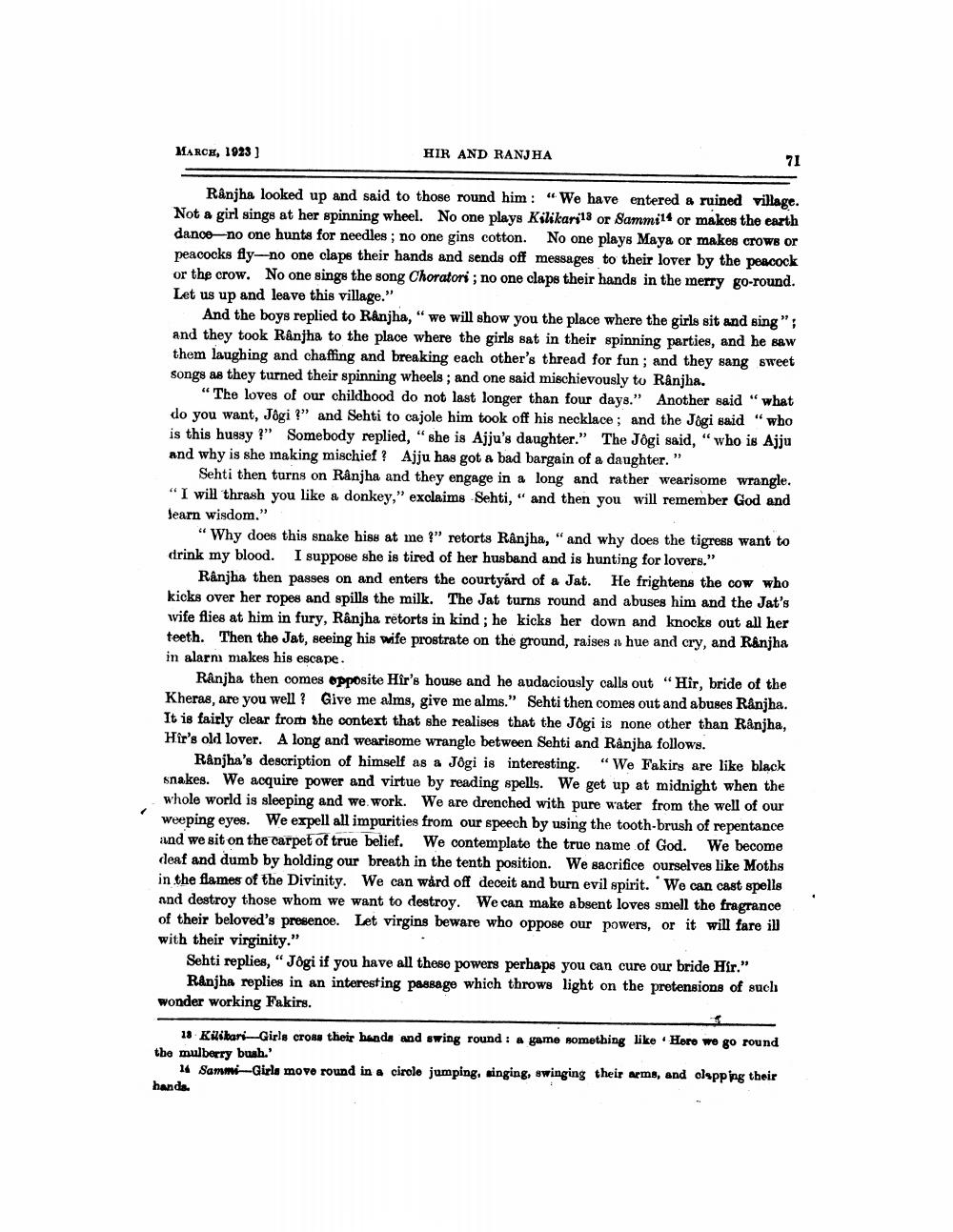________________
MARCH, 1923]
HIR AND RANJHA
Ranjha looked up and said to those round him: "We have entered a ruined village. Not a girl sings at her spinning wheel. No one plays Kilikari13 or Sammi14 or makes the earth dance-no one hunts for needles; no one gins cotton. No one plays Maya or makes crows or peacocks fly-no one claps their hands and sends off messages to their lover by the peacock or the crow. No one sings the song Choratori; no one claps their hands in the merry go-round. Let us up and leave this village."
71
And the boys replied to Ranjha, "we will show you the place where the girls sit and sing "; and they took Ranjha to the place where the girls sat in their spinning parties, and he saw them laughing and chaffing and breaking each other's thread for fun; and they sang sweet songs as they turned their spinning wheels; and one said mischievously to Rânjha.
"The loves of our childhood do not last longer than four days." Another said "what do you want, Jôgi ?" and Sehti to cajole him took off his necklace; and the Jogi said "who is this hussy?" Somebody replied, "she is Ajju's daughter." The Jôgi said, "who is Ajju and why is she making mischief? Ajju has got a bad bargain of a daughter."
Sehti then turns on Rânjha and they engage in a long and rather wearisome wrangle. "I will thrash you like a donkey," exclaims Sehti," and then you will remember God and learn wisdom."
"Why does this snake hiss at me?" retorts Rânjha, "and why does the tigress want to drink my blood. I suppose she is tired of her husband and is hunting for lovers."
Ranjha then passes on and enters the courtyard of a Jat. He frightens the cow who kicks over her ropes and spills the milk. The Jat turns round and abuses him and the Jat's wife flies at him in fury, Rânjha retorts in kind; he kicks her down and knocks out all her teeth. Then the Jat, seeing his wife prostrate on the ground, raises a hue and cry, and Ranjha in alarmı makes his escape.
Ranjha then comes opposite Hir's house and he audaciously calls out "Hir, bride of the Kheras, are you well? Give me alms, give me alms." Sehti then comes out and abuses Ranjha. It is fairly clear from the context that she realises that the Jogi is none other than Rânjha, Hir's old lover. A long and wearisome wrangle between Sehti and Rânjha follows.
Ranjha's description of himself as a Jôgi is interesting. "We Fakirs are like black snakes. We acquire power and virtue by reading spells. We get up at midnight when the whole world is sleeping and we work. We are drenched with pure water from the well of our weeping eyes. We expell all impurities from our speech by using the tooth-brush of repentance and we sit on the carpet of true belief. We contemplate the true name of God. We become deaf and dumb by holding our breath in the tenth position. We sacrifice ourselves like Moths in the flames of the Divinity. We can ward off deceit and burn evil spirit. We can cast spells and destroy those whom we want to destroy. We can make absent loves smell the fragrance of their beloved's presence. Let virgins beware who oppose our powers, or it will fare ill with their virginity."
Sehti replies, "Jôgi if you have all these powers perhaps you can cure our bride Hir."
Ranjha replies in an interesting passage which throws light on the pretensions of such wonder working Fakirs.
18 Kilibari Girls cross their hands and swing round: a game something like Here we go round the mulberry bush.'
14 Sammi-Girls move round in a circle jumping, singing, swinging their arms, and clapping their hands.




